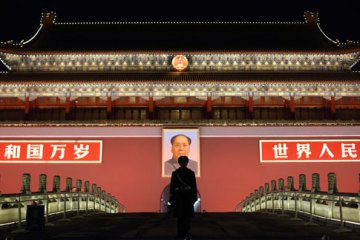On May 7, China released the second draft of a wide-reaching new national security law for public consultation (for an English rendering, see China Law Translate, where a full translation is already well underway). Last month, after an internal second reading of the draft, Reuters reported that the law would focus on “harmful moral standards,” and noted that the security legislation in effect since 1993 had its name changed late last year:
China reviewed a new national security law during a meeting of its legislature’s top body that will deal with a range of risks, including “harmful moral standards”, state media said on Monday.
[…] “The draft law called for reinforced education and dissemination of socialist core values, to prevent the infiltration of harmful moral standards,” Xinhua said, without elaborating.
The news agency said the draft law included clauses that deal with “important industries and sectors deemed vital to the economy, which would prevent financial risks through the development of financial infrastructure and capabilities, and a grain security system”.
It also deals with the establishment of “systems for cyber and information security”, Xinhua said.
[…] Last November, China renamed its first national security law, which took effect in 1993, as the Counterespionage Law. […] [Source]
At the South China Morning Post, Verna Yu outlines the incredibly wide reach of the proposal—covering political, commercial, technological, religious, ideological, and military issues as comprehensive security concerns. Yu also notes concerns from analysts on the law’s potential to further limit rights, and from legal experts on the draft’s vague explanation of how the law will be implemented:
Dr Eva Pils, a China law expert at King’s College, University of London, said that by not making a direct reference to the [newly formed National Security Commission, led by Xi Jinping …], the law was leaving open which party entity would be in charge of national security. And as the law did not regulate party organs nor seek to curb the party’s power, it affirmed the party’s supremacy over the state on national security.
Pils said she was also worried that the definition of national security meant that “practically any aspect of social or economic life can be regarded as a matter of national security and thus gives the institutions empowered by the law a mandate to intervene”.
“I think the law also manifests a neo-totalitarian ambition to reach into every sector or society,” she said.
[…] Joshua Rosenzweig, a law researcher at the Chinese University of Hong Kong, said he was alarmed at the “strong ideology flavour” of the draft law and the fact that “a strong link has been drawn between the nation and the one-party political system”.
William Nee, China researcher at Amnesty International, said international practice was for national security laws to be drawn “narrowly” and “with precision”, referring to specific threats. But this draft would cement many problematic concepts that had little to do with national security, such as maintaining “internet sovereignty” through censorship, promoting socialist core values, defending against “unhealthy” culture, and limiting freedom of religion. [..] [Source]
Click through for more details from the SCMP on the proposed law’s wide reach, and their helpful bulleted summary of its main points.
Similar concerns have also been expressed over other recently proposed laws. A draft anti-terrorism law earlier this year sparked concern from activists for potential to erode religious and ethnic rights, from diplomats and multinational companies for data disclosure requirements, and from legal scholars for its vague definition of terrorism; as concerns about its implications continued to echo, the draft failed to become law at this year’s National People’s Congress legislative meetings as expected. (China Law Translate also translated the draft anti-terrorism law in full.) Likewise, the proposed Foreign NGO Management Law raised concerns. The first draft of the law disallowed foreign NGO’s to open in China, where overseas non-governmental organizations are currently embattled amid an ongoing drive to reinforce ideological orthodoxy. A second draft of the law provided the possibility of opening offices, but only upon direct permission from the State Council.
A separate article from the SCMP’s Jeffie Lam looks at the territorial and sovereignty implications of the proposed national security law, noting that it emphasizes the duties of semi-autonomous Hong Kong and Macau, and de facto independent Taiwan—a departure from current PRC national security legislation:
Article 11 of the draft states: “China’s sovereignty and territorial integrity brook no division. Safeguarding China’s sovereignty and territorial integrity is the common obligation of all Chinese people, including people in Hong Kong and Macau as well as Taiwan.”
Article 36 goes on to say: “The Special Administrative Region of Hong Kong and the Special Administrative Region of Macau must fulfil their responsibility to safeguard national security.”
[…] While legal experts doubt that China’s national security legislation can be directly enforced here, local commentators and politicians see the unprecedented reference to Hong Kong as a clear signal Beijing wants the city to stop dragging its feet on drawing up its own legislation to ban acts of “treason, secession, sedition or subversion”, as stipulated under Article 23 of the Basic Law.
It will be a tough sell to the public, judging by mass protests sparked by the last attempt in 2003 that led to the early resignation of former chief executive Tung Chee-hwa. Many in Hong Kong feared their rights and freedoms would be curtailed back then, and they continue to treat any talk of national security legislation with suspicion. [Source]
Lam also notes that the draft is not expected to be made law until the March 2016 meeting of the NPC, at the earliest. Last year, protests against encroaching mainland influence swept Taiwan, a months-long pro-democracy movement occurred in Hong Kong, and police detained several activists for staging an unofficial referendum on democracy in Macau.







